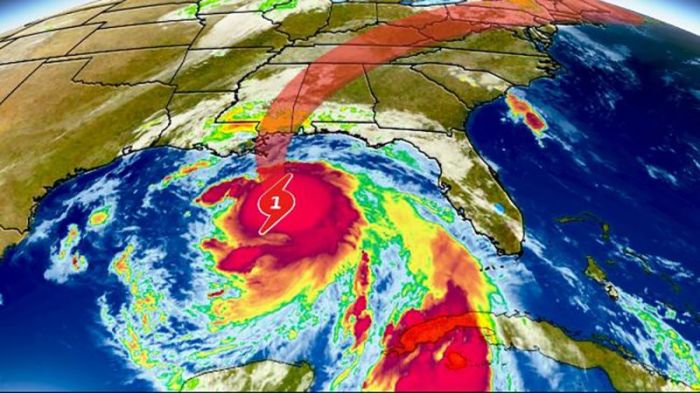Hurricane Nate Path, Track Hits US Golf Coast as Cat 1 Storm, 85 MPH
MANAGUA — Hurricane Nate may strengthen on Saturday, threatening to hit the U.S. central Gulf Coast with strong winds and storm surges after it killed at least 25 people in Central America.
New Orleans evacuated some residents from areas outside its levee system as Nate, a Category 2 hurricane, churns toward the central Gulf of Mexico.

"Nate is at our doorstep or will be soon," New Orleans Mayor Mitch Landrieu said, adding that the winds could cause significant power outages, and storm surges are projected to be 6 to 9 feet (1.8 to 2.7 meters) high.
"We have been through this many, many times. There is no need to panic," Landrieu told a news conference.
The storm brushed by Mexico's Yucatan peninsula, home to beach resorts such as Cancun and Playa del Carmen, as it headed north, the U.S. National Hurricane Center in Miami said.
With maximum sustained winds of 80 miles per hour (130 kmh), Nate was about 345 miles (550 km) south-southeast of the Mississippi river and expected to strengthen before it makes landfall, the NHC said.
A state of emergency was declared for 29 Florida counties and states — Alabama, Louisiana and Mississippi — as well as the New Orleans, which was devastated by Hurricane Katrina in 2005.
The NHC issued a hurricane watch from Grand Isle, Louisiana, to the Alabama-Florida border.
"By Saturday noon you should be in your safe place," Alabama Governor Kay Ivey told a news conference. "This is a fast-moving storm and we must begin preparing now."
Nearly three-quarters of U.S. Gulf of Mexico oil production was offline ahead of the storm, and more oil companies halted operations on Friday.
On Saturday morning, Nate was moving north-northwest at 22 miles per hour (35 kmh), a fast pace which if maintained could mean the storm does less damage when it hits land.
CENTRAL AMERICA DEATHS
The storm doused Central America with heavy rains on Thursday, killing at least 12 people in Nicaragua, nine in Costa Rica, two in Honduras and two in El Salvador.
>
Thousands were forced to evacuate their homes and Costa Rica's government declared a state of emergency.
Costa Rican President Luis Guillermo Solis urged residents to remain vigilant, noting rains would likely resume.
In Honduras, residents wondered whether they would have to flee. Norma Chavez and her two children anxiously watched a river rise outside their home in Tegucigalpa, the capital.
"We are worried that it will grow more and carry away the house," said Chavez, 45.
Through Monday, Nate is expected to produce 2 to 4 inches (5 to 10 cm) more rain in eastern Yucatan and western Cuba and 3 to 6 inches (8 to 15 inches) in the U.S. central Gulf Coast.
About 71 percent of U.S. Gulf of Mexico oil production and 53 percent of natural gas output is offline ahead of Nate's arrival, the U.S. Department of the Interior's Bureau of Safety and Environmental Enforcement said on Friday.
Oil companies have evacuated staff from 66 platforms and five drilling rigs, it said. Oil production equaling 1.24 million barrels of crude per day is offline, according to BSEE.
Reporting by Brendan O'Brien in Milwaukee; editing by Alexander Smith



























